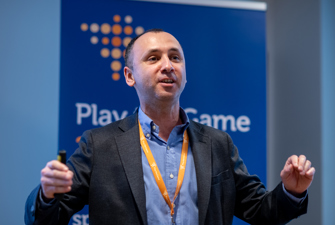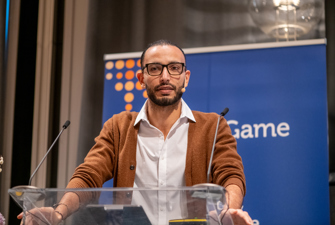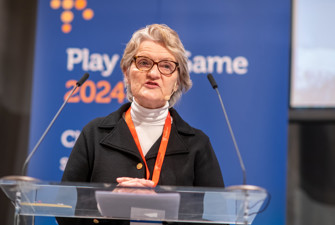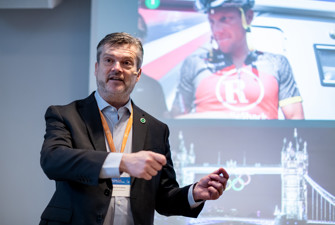US anti-doping director: There is an incredible need for an anti-crime agency in sport
Having learnt from the creation of the World Anti-Doping Agency (WADA) 25 years ago, Travis Tygart, the CEO of USADA, warns against producing 2,643 pages of legislative documents to regulate an agency countering crime and protecting integrity in sport.
2,643 pages. That's how much space is taken up by the documents that regulate the world anti-doping agency WADA. But there is no need for the regulation of a new anti-crime agency for sport to take up as much space.
So says Travis Tygart, CEO of United States Anti-Doping Agency, who took part in a debate at Play the Game 2024 on the need for creating a new world agency to protect the integrity of sport and combat other forms of crime in sport than doping.
"There is an incredible need for it, particularly because of the sexual abuse cases in sport. It's horrific stories. Sport has to care about individual lives who are being affected," the American says.
"And the manipulation of competitions as well. Just as in the anti-doping space, the public, broadcasters, and sponsors are not going to stand for sport that does not have a legitimate outcome. Fairness is at the heart of why we play sport in life. Sport is so valuable, so I think absolutely there is a need for it."
How to build a new anti-crime agency in sport is a different question to Tygart:
"But we have to continue moving down this path. It is only a matter of time, I think, before the scandal hits. We have seen it in certain sports around the world."
The dark side always exposes itself
The US anti-doping director points to the fact that betting becomes more and more lucrative for those who are willing to break the rules.
He also refers to the ongoing corruption trial in Norway against Anders Besseberg, the former president of the international Biathlon Union (IBU), as an example of the need to fight crime in sport.
And to Tygart, older doping cases involving Lance Armstrong, Russian sport, weightlifting, and track and field are all examples of a type of sports related crime that it is still highly relevant for sports authorities and governments to investigate.
"It is only a matter of time before something happens. And then those who want to see change are going to be in a certain state of panic like the world of sport was back in 1999 and that ultimately led to the World Anti-Doping Agency being established," he says.
"The dark side always exposes itself. In the US, we now have an unprecedented piece of legislation that gives 20 million dollars to the U.S. Center for SafeSport, an independent organisation that tries to tackle these issues. There is a lot of 'devil in the detail' of how to make that truly effective, both in the US but also around the world."
An independent agency with proper authority
Furthermore, Tygart says that a new anti-crime agency must be independent.
"It can't be a political body where politicians are influencing the decisions. And then I think you need to have the proper authority. That means it cannot become an overly bureaucratic organisation that through regulation attempts to control everyone and gets rid of the discretion and trust of those in the field who have to make difficult decisions."
Tygart warns against legislating with more than 2,600 pages of documents that no one is reading or paying attention to.
"WADA has grown in an unfortunate way. This strategy was an overreaction. Even with the 2,600 pages of documents they did not prevent a Russia from happening. And look, Russia is still not compliant today, so who are we fooling?"
Incredible failures in anti-doping
Nevertheless, the US anti-doping director also gives credit to WADA for many victories in the past 25 years.
"We see incredible failures of the current anti-doping system. That does not erase all the great work. But a byproduct of all this regulation is that no one takes responsibility and let us be clear: We have a long way to go to win the gold medal for clean athletes."
At the conference in Trondheim, freelance journalist Grit Hartmann presented the results of a Play the Game survey that examines the need for the creation of an agency to fight other crimes in sport than doping.
After the presentation of the survey results, a number of speakers including Richard McLaren, Ingrid Beutler, Jerome Champagne, and Jean-Yves Lourgouilloux presented their views on how to build a new world agency to protect the integrity of sport.















